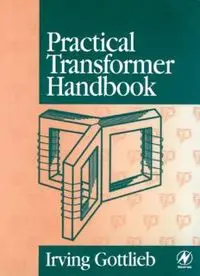Table Of ContentPractical Transformer Handbook
Practical Transformer Handbook
Irving M. Gottlieb RE.
< »
Newnes
OXFORD BOSTON JOHANNESBURG MELBOURNE NEW DELHI SINGAPORE
Newnes
An Imprint of Butterworth-Heinemann
Linacre House, Jordan Hill, Oxford OX2 8DP
225 Wildwood Avenue, Woburn, MA 01801-2041
A division of Reed Educational and Professional Publishing Ltd
S . A member of the Reed Elsevier pic group
First published 1998
Transferred to digital printing 2004
© Irving M. Gottlieb 1998
All rights reserved. No part of this publication may be reproduced in
any material form (including photocopying or storing in any medium by
electronic means and whether or not transiently or incidentally to some
other use of this publication) without the written permission of the
copyright holder except in accordance with the provisions of the Copyright,
Designs and Patents Act 1988 or under the terms of a licence issued by the
Copyright Licensing Agency Ltd, 90 Tottenham Court Road, London,
England WIP 9HE. Applications for the copyright holder's written
permission to reproduce any part of this publication should be addressed
to the publishers
British Library Cataloguing in Publication Data
A catalogue record for this book is available from the British Library
ISBN 0 7506 3992 X
Library of Congress Cataloguing in Publication Data
A catalogue record for this book is available from the Library of Congress
DLAOTA
TREE
Typeset by Jayvee, Trivandrum, India
Contents
Preface ix
Introduction xi
1 An overview of transformer s i n electrical technology 1
Amber, lodestones, galvanic cels but no transformens 1
The ideal transformer - an ethereal but practical entity 3
A practical question - why use an iron core in transformers? 4
Why does a transformer transform? 6
Gore or shel-type transformer construction 9
Transformers utilizing toroids and pot cores 13
Bels, whistles and coments 15
Imortality via over-design, sheltered operation and a bit of luck 17
Direct current ambient temperature resistance -just the beginning
of coper loses 19
More can be done after ringing door-bells, lighting lamps and
runing toy trains 2
2 Specialized transformer devices 25
Saturable converters - another way to use transformers 25
Energy transfer without flux linkages - the parametric converter 31
The Lorain subcycler - an erstwhile parametric converter 36
The constant curent transformer 38
The constant voltage transformer 40
Saturable reactor control of a. c. power 41
Transformer action via magnetostriction 45
A double core transformer for saturable core inverters 47
3 Operational features of transformers 49
Operation of transformers at other than their intended frequencies 50
vi Contents
Next to magic, try the auto-transformer for power capability 52
Dial a voltage from the adjustable auto-transformer 5
Transformer phasing in d.c. to d.c. converters 57
Transformer behaviour with pulse-width modulated waveforms 58
Curent inrush in sudenly-excited transformers 62
Transformer temperature rise - a posible coldown 64
High efficiency and high power factors are fine, but don't forget
the utilization factor 6
Transformers in thre-phase formats - al's wel that's phased wel 72
Recapturing the lost function of the power transformer 73
Bandpas responses from resonated transformers 74
4 Interesting aplications of transformers 78
Remote controling big power with a smal transformer 78
The use of a transformer to magnify capacitance 78
A novel transformer aplication in d.c.-regulated suplies 81
Polyphase conversions with transformers 83
The hybrid coil ~ a transformer gimick for two-way telephony 84
Transformer schemes for practical benefits 85
Transformers in magnetic core memory systems 87
The transmision line transformer - a diferent bred 8
Transformers as magnetic amplifiers 97
Transformer coupling batery charging curent to electric vehicles 9
5 High-voltage t ransformers 104
Emphasis on high voltage 104
Steped-up high voltage from not so high turns ratio 105
A brute force aproach to tesla coil action 107
Transformer technique for skirting high voltage problems 108
A novel winding patern 1
Other techniques for high voltage transformation 12
The curent transformer 15
Steping-up to high voltage and new transformer problems 16
6 Miscelaneous transformer tc»piGS 19
Transformer saturation form geomagnetic storms 19
The strange 4.4 factor in the transformer equation 12
Link coupling - transformer action over a distance 124
Homing in on elusive secondary voltage 126
An aparent paradox of electromagnetic induction 128
Transformer technique with 'shorts' - the induction regulator 130
Constant curent transformers incorporating physical motion 131
A novel way to null transformer action between adjacent tuned
circuits 13
Transformers only do what comes naturaly 138
Contents vii
The flux gate magnetometer 139
Transformer balancing acts - the comon-mode choke 140
Mutual inductance, coeficient of coupling and leakage inductance 143
Short-circuit protection of power lines via a unique transformer 145
Apendix - Useful information 149
Index 169
This Page Intentionally Left Blank
Preface
Since the dawn of the electrical age, many excellent treatises dealing with
transformers have been available, one differing from another in the depth of the
mathematical rigour involved. However, the salient feature common to most has
been their preoccupation with the transformers used in the 50/60Hz utility
industry.
This book takes a somewhat different tack; it deals largely with transformers
more relevant to electronic technology, control techniques, instrumentation, and
to unusual implementations of transformers and transformer-like devices. In so-
doing, the author feels that the highest usefulness will ensue from emphasis on the
practical aspects of such transformers and their unique applications. For, if prop-
erly done, those readers wishing to probe further will have been guided along
appropriate paths to extended investigation. The underlying objective is to stimu-
late the creativity of engineers, hobbyists, experimenters and inventors, rather
than to provide a conventional classroom-like text.
It is to be hoped that a readable and interesting exposition of the topic will help
dispel much of the prevalent notion that transformers are mundane devices of a
mature technology with little prospect of further evolutionary progress. To this
end, it should be easy to show that the traditional treatment of transformers,
although providing a solid academic-foundation, tends to confine the modern
practitioner to a bygone era.
Irving M. Gottlieb RE.

